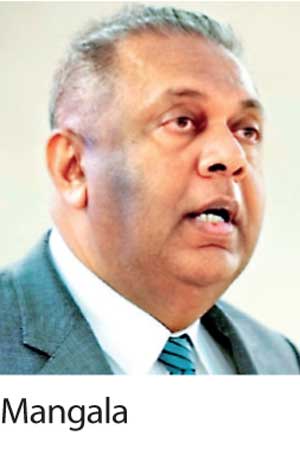27 Mar 2018 - {{hitsCtrl.values.hits}}
 Building awareness on tax compliance and giving five-star hospitality treatment to the potential taxpayers are paying dividends, with more tax files being opened after Sri Lankans participated in such seminars, according to the Finance Ministry.
Building awareness on tax compliance and giving five-star hospitality treatment to the potential taxpayers are paying dividends, with more tax files being opened after Sri Lankans participated in such seminars, according to the Finance Ministry.
“After the programme held in Matara, around 250 to 300 new tax files were opened voluntarily. If the public is made aware, those who are in higher positions of responsibility in society would view paying taxes as a contribution to the country’s development,” Finance and Mass Media Minister Mangala Samaraweera said.
He was speaking at a seminar organised by the Inland Revenue Department at Galadari Hotel in Colombo.
“This movement was started in Matara, my home town and a similar programme is being held here. It will inform the existing taxpayers on the changes coming with the new Inland Revenue Act and attempt to motivate the potential taxpayers to become compliant with the tax laws. We hope to continue this in each district,” he said.
The price of a ticket to participate in the seminar at Galadari was Rs.5,000 and the minister said that going forward, the events would be free of charge.
“We need not charge Rs.5,000. I think we should allow the public to come here and I believe that despite our very low taxes, we can afford to give a free lunch,” Samaraweera said.
Sri Lanka’s tax to gross domestic product (GDP) ratio fell from 19 percent in 1990 to 10.1 percent in 2014. There has been a rebound, reaching up to 12.4 percent of GDP each in 2015 and 2016.
Samaraweera said that a complex and confusing tax system was made even weaker with tax concession.
“There were numerous ad hoc tax concessions, over 200 of them, which were granted without any rationale, according to the whims and fancies of the finance minister of the day,” he said.
Samaraweera is depending on the new Inland Revenue Act—hailed as being simple and easy to comply with—to bring direct taxes as a portion of total taxation to 40 percent, from the current 18 percent.
He said that increasing direct taxes would reduce the tax burden placed on the lower income groups, compared to the current indirect tax-focused policies, where the lower and higher income groups pay almost similar levels of taxes.
19 Nov 2024 31 minute ago
18 Nov 2024 8 hours ago
18 Nov 2024 9 hours ago
18 Nov 2024 9 hours ago
18 Nov 2024 18 Nov 2024